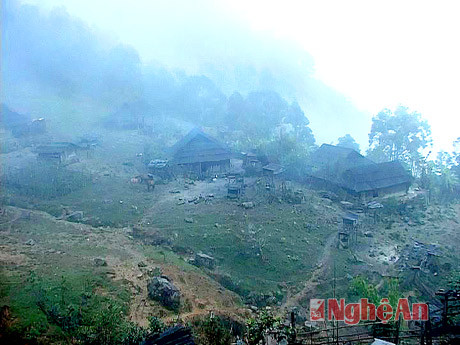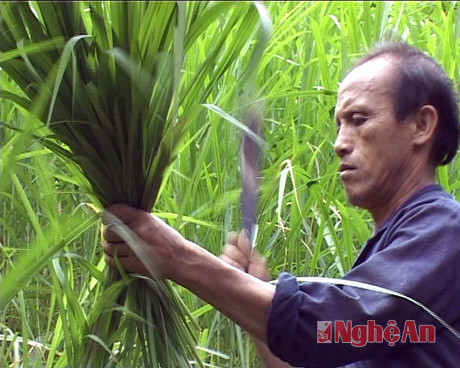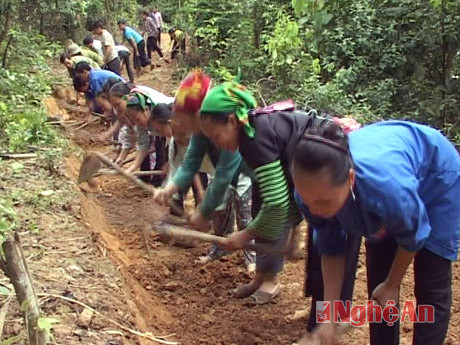Old Man Nhen Thong and His Desire to Break the Lock
(Baonghean) - Every morning, when the rooster flaps its wings three times and crows, he gets up, puts on his hat, puts on his canvas shoes, carries his bag, takes his flashlight and leaves the village. His feet have walked a lot so he is familiar with every tree root and every stone. The villagers say that he is like the Moong Nam stream flowing into the village from the top of Pha Khao. He does not think that he is that stream. Because Moong Nam flows endlessly all year round, while Pha Khao is towering. He thinks that he is just a rice plant on the field, a corn plant growing from this barren land.
(Baonghean) - Every morning, when the rooster flaps its wings three times and crows, he gets up, puts on his hat, puts on his canvas shoes, carries his bag, takes his flashlight and leaves the village. His feet have walked a lot so he is familiar with every tree root and every stone. The villagers say that he is like the Moong Nam stream flowing into the village from the top of Pha Khao. He does not think that he is that stream. Because Moong Nam flows endlessly all year round, while Pha Khao is towering. He thinks that he is just a rice plant on the field, a corn plant growing from this barren land.
From Ban Ve Hydropower Plant, we took a motorboat and went upstream to Huoi Xa village - the central village of Mai Son commune, Tuong Duong district. But this was not the final destination even though we had spent 4 hours floating on the river. "Going to Pha Khao! It will take nearly 2 more hours. Then let's go together, I also have work to do there. The commune leaders are all assigned to be in charge of the area. I am in charge of Pha Khao". We felt like the burden had been relieved when Mr. Lo Dai Duyen - Chairman of Mai Son Commune People's Committee announced that. On the way, the Chairman of Mai Son Commune People's Committee said that Pha Khao is a village located in the most difficult area of the commune. Mr. Duyen did not have to prove much about this, the winding roads with steep slopes and jagged rocks made anyone coming here for the first time terrified.
Until now, I still have the feeling of the motorbike rushing down the slope with the wind cutting across my ears. A few years ago, no one dared to think that there would be a road connecting Huoi Xa to Pha Khao. “Old Man Nhenh Thong has made a great contribution!”. The recognition of the commune chairman for Old Man Nhenh Thong - the most prestigious person in Pha Khao village - helped us have more confidence to find the Mong ethnic village, located at the highest and farthest point of Mai Son commune in particular and Tuong Duong district in general.
We arrived at Pha Khao at 10am. Old man Nhenh Thong was still in the mountains and had not returned yet. While we were struggling to find a place to rest, the village chief Tho Ba Lu came by on his motorbike. On the motorbike were still tied stacks of school books that he had just gone to the commune to pick up for the children in the village. "We have to wait, maybe Nhenh Thong will come back after noon. The chickens have not yet hatched their nests" - Having said that, Tho Ba Lu led us around the village. There were still low houses with roofs made of samu and pơmu wood, typical of the Mong people, but the biggest difference I noticed was that they were all carefully fenced.
 |
| A corner of Pha Khao village. |
Touching the newly tied knot, Tho Ba Lu said that in the past, the houses of the villagers did not have fences, so it was difficult to grow vegetables or raise chickens. Wild animals and pigs would come and destroy everything. Now things are different, every house has vegetables to eat, and black chickens have nests to jump on. Every house in the village raises cows, the big ones raise five or seven, the small ones only a few. "Thanks to Elder Nhenh Thong." Hearing what the village chief Tho Ba Lu said, we were even more eager to meet Elder Nhenh Thong.
And we didn’t have to wait long, following Ba Lu’s hand, we saw the shadow of a man whose steps seemed to be unable to keep up with his heels, heading towards the village from the hillside. As soon as we met, I was immediately impressed by the open smile with the gold-capped teeth of Nênh Thông. “Oh! I didn’t know the chairman and the journalist were coming to the village. We had to bring salt into the forest early, when “his” cow hadn’t had time to go into the forest yet…” So, every morning, Elder Nênh Thông had to cross the mountain, go into the forest to bring salt to the cows. The first thing, according to Nênh Thông, was that “his” cow wouldn’t abandon him, and the second was that there had to be mineral salts for the cattle to be healthy, to fight against diseases and the cold in the mountains. With that same sparkling smile, he said: “We also have to have salt! His cow is the same!”
Currently, Gia Nhenh Thong's family raises over 10 cows, of which 2 are kept in captivity to fatten up and wait for sale. Raising cows in captivity in Pha Khao village used to be a big problem. The thing is, in the past, very few villagers had cows, and even less had the habit of keeping them in captivity. When Gia Nhenh Thong mentioned developing the herd of buffalo and cows, no one listened, no one followed. If you want to raise more cows, you need land to grow elephant grass and milkweed. Where can you get them in the rocky mountains? It's not that the villagers don't have a reason.
But Nhen Thong thought differently. He had lived more than half his life in this remote area, where he had not yet set foot. Steep forests, rocky mountains, and hillsides, but there were still holes in the ground to plant corn seeds and seedlings. The important thing was to be diligent. This was something the Mong people had in abundance. Whatever they thought of, they did. For a long time, at dawn, Old Nhen Thong would pack his bag and leave the village. No one knew what Nhen Thong was looking for in the mountains. It turned out that Nhen Thong was looking for a path, looking for a hill to lead elephant grass into the holes in the rocks, and to grow milkweed on the slopes of the fields.
Pha Khao did not disappoint his efforts. The patches of elephant grass grew together. The first time Gia Nhenh Thong carried a bundle of elephant grass back to the village, everyone was surprised. They were even more surprised when they saw Nhenh Thong chop the grass into pieces and mix it with salt to feed the cows. It seemed like something out of nowhere, not in Pha Khao. But the villagers still did not believe it right away.
Old man Nhenh Thong understands the Mong people very well. They are very hard-working, diligent, and industrious, but they are also conservative. Knowing that, he first mobilized his brothers and relatives to do the same. One family, two families, three families... and now 43 families in the village, every family raises cows. Cows are grazed on the mountain, cows are kept in cages and fattened in barns. When everyone believes, everything is easy to do. Nhenh Thong suggested to the Party cell and the village management board that they should demarcate and separate the grass growing area from the swidden area, and move the cow and buffalo pens closer to the pasture. This will both prevent cattle from damaging rice and corn and make it easier to raise and manage them.
 |
| Old Man Nhenh Thong is the pioneer in planting elephant grass in Pha Khao village. |
Since Pha Khao had a buffalo or cow that he wanted to sell, he didn’t have to go far. Traders came to buy it right in the village and then led it up to My Ly (Ky Son) to transport it downstream. A cow was worth at least 15 million VND. The villagers were all excited. “Thanks to the Party and the State, the support of cows from Program 30a, otherwise our village wouldn’t be like it is now.” That’s what Nhenh Thong said, but everywhere there needs to be someone with heart and experience for the villagers to follow. The 90 cows, 80 pigs, and nearly 10 buffaloes of the village are proof of Nhenh Thong’s efforts. Up to now, every family in the village has formed the mindset: if they want money, they have to raise cows. “If a family doesn’t have the means, I will lend them half the price of the cow, and when the cow gives birth, they will pay me the rest” - Elder Nhenh Thong thought so and did so to help many households in the village. It must also be said that, according to the customs of the Mong people, lending and borrowing is very rare. If a family is hungry, everyone in the community will contribute a few bundles of rice and corn to support; if a family lacks people to clear the fields, sow seeds, and plant corn, the village will mobilize people to work for a few days, but lending and borrowing is almost absent from the people's thinking. This is not just a matter of hunger and sustenance, but also a matter of self-respect with its own identity. However, with the way of doing things of Nhenh Thong, no one objected.
But the people of Pha Khao village do not only talk about Gia Nhenh Thong through his great contribution in developing the cattle herd and expanding the area of elephant grass to over 3 hectares. People also say that if it were not for Gia Nhenh Thong, the 15 km road connecting Pha Khao village to Huoi Xa - the central village of Mai Son commune, would never have been built. The dream of a real road has become an obsession for the people of Pha Khao. Not to mention selling squash and melons, even children who want to go to school and sick people who need medical treatment cannot be treated in time.
People in the village saw that one day, Gia Nhenh Thong went with the Border Guard, another day, he went with the Village Management Board, and many times he went to each household alone to persuade people to contribute their efforts to build the road. Like the Mong people in other places, the people of Pha Khao village were used to going on the hills and fields, working until dark before returning home, few people had time to go to the mountains to clear the road. But everyone listened to Gia Nhenh Thong. Two years with thousands of working days for 15 km of road, that was a tremendous effort of a collective of over 270 people of Pha Khao village.
 |
| Road construction in Pha Khao village. |
Even now, the village chief Tho Ba Lu also affirmed: "If we build a road for ourselves, everyone has to do it." Ba Lu also said that every few months, the villagers voluntarily call each other to repair the road once. Although there are still many steep passes, motorbikes can now enter the village. Salt grains are also more readily available. Who would have thought that one day the village precariously located on the top of Pha Khao would become so normal? The village named after that mountain only needs to clear the fog, and in less than half a day's journey, it will be in Laos, but for more than 10 years now in Pha Khao, no one has voluntarily migrated. Captain Nguyen Ngoc Chi - an officer of Border Guard Station 523 said that this was thanks to Elder Nhenh Thong. But when I asked Nhenh Thong, he said that the villagers already had stable housing, every family raised cows, grew grass, and every house had fences, so where else would they go?
Gia Nhenh Thong is an approachable but quiet person, or perhaps he doesn’t want to talk much about what he has done. Even the “event” that he has a daughter named Gia Y Chu who is studying at Vinh University – Faculty of Preschool Education, I only found out much later. Gia Y Chu is the first Mong girl in Mai Son commune to study at university. Or the story of Gia Nhenh Thong whose son has just accepted a job at Border Post 523 – Mai Son commune (Tuong Duong) that we were not told by him. “Pha Khao has changed but is still poor” – he admitted that fact as if he was taking the blame on himself. It is easy to think that this has nothing to do with Nhenh Thong when in his house the kitchen is still burning regularly, outside the coop there are fifty or sixty black chickens, then cows, then pigs… But perhaps he was voted the most prestigious person in the village not because of the material things his family has.
I stayed in Pha Khao for 2 days, drank sips of wine that still had the cool taste of Moong Nam stream, but I was most impressed by the first noon in the village. During the meal, everyone joked with each other: "This is a solidarity meal", because there was the Chairman of the commune Lo Dai Duyen, there was Captain Nguyen Ngoc Chi - Border Guard at Station 523 Mai Son, there was the Secretary of the Party Cell of Gia Ba Gau village, there was the Chief of Tho Ba Lu village. Especially that meal was even more cozy because of the presence of Mr. Gia Lia Xa, father of Gia Nhenh Thong. According to the custom of the Mong people, the father does not live in the same house with the eldest son, but with the second son. And that day, Nhenh Thong invited his father to his house with all humility and respect. Humility in the way he listened, respect in each time he served food to his father. I noticed that sometimes Gia Lia Xa looked at the eldest son whose hair was already streaked with silver. In the eyes of the 75-year-old man who used to be a cadre of Tuong Duong district, there was joy mixed with pride in his child. The child who once followed him to plant each stake and tie each strip of bamboo to make sturdy fences.
The Mong ethnic people call it Pha Khao, which means white mountain... I jokingly said: "Now it should be called green mountain"... We all laughed out loud. The laughter echoed off the mountain walls, creating strange sounds. It was as if only standing at an altitude of 1000m in Pha Khao could one truly hear the aspirations of people's hearts.
Dao Tuan
